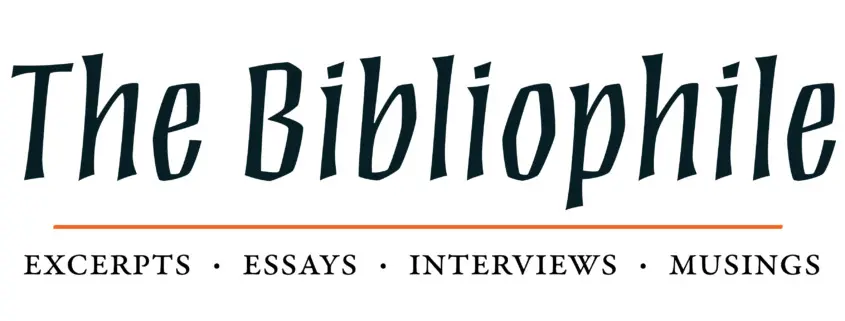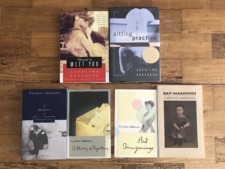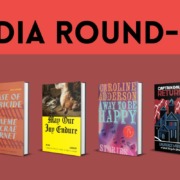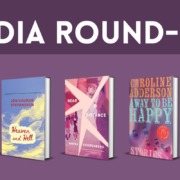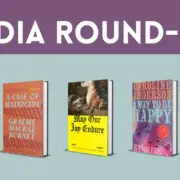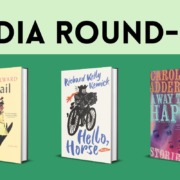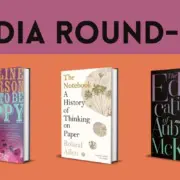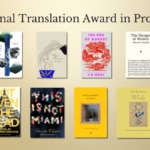The Bibliophile: The Happiness Update
Want to get new excerpts, musings, and more from The Bibliophile right away? Sign up for our weekly newsletter here!
***
I first came across Caroline Adderson‘s work in university. I’d recently fallen in love with the short story—“Do you want to read some good shit?” my second-year creative writing prof had asked, putting Clark Blaise’s Tribal Justice and A North American Education into my hands: I did, it was some good shit, and I was very hungry for more of the same. I was also hungry for a job that didn’t involve picking flecks of metal out of my flesh at the end of every shift, a job that didn’t have me dreaming of sulphurous light and didn’t leave my hand clenched throughout the night around the trigger of an invisible welding gun. I wanted to work in a bookshop. But no one seemed to want me to work in one. I wasn’t cool enough to work at South Shore Books, and the lady on Park Street who sold leftist philosophy scared me so much I couldn’t muster the courage to drop off a resume. The Bookmark and the chain stores downtown and at the mall never called me back. And Anne Beer at the Bookroom at the Court couldn’t afford staff, though she’d be happy to train me as a bookseller if I volunteered. So I did, riding my bike down to her shop one Sunday for my first shift. I spent all of it dragging an industrial carpet cleaner across her floors, wondering all the while what exactly this had to do with being a bookseller (Anne: I understand completely now). When I was finished, she let me select a few books as compensation. I remember grabbing a blue cloth hardcover of Jowett’s translation of Plato’s Dialogues, and then I started browsing in the CanLit section. This was a new concept to me. And there was Blaise, Man and His World, and from the same publisher, with the weird little figure on the spine, a story collection called Bad Imaginings, by Caroline Adderson. I’d never heard of her, but the stories sounded interesting and it was cheap, so I added it to the pile.
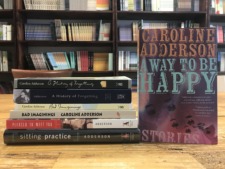
Photo: Caroline Adderson’s newest collection of short stories, A Way to Be Happy, comes out September 10!
If Blaise had been my gateway to the pleasures of the short story, it was perhaps Adderson who made me an addict. I read her first collection with intense pleasure, marveling at the range and style and humour. So many short story writers’ work seemed to me at the time to be set within the slightly fluctuating boundaries of their personal universes: in Bad Imaginings, one travelled galaxies, moving back and forth through time and historical situations. Here were stories that were rich and clear-eyed and playful and generous, stories that felt, and widely.
I’ve read almost everything that Caroline’s written since, all of her adult work and even, in bed with one of my children, much of her kid lit (Very Serious Children is a family favourite). All of it shows the same generosity and playfulness. I loved her novels, especially A History of Forgetting and Sitting Practice (we have republished a new version of the former, alongside Bad Imaginings: each is worth picking up). In 2006, another collection, Pleased to Meet You, was as rich and varied as her first. After that, the odd story would show up in magazines, The Walrus and The New Quarterly and elsewhere, and we even published a couple in CNQ: Canadian Notes & Queries, and these I read (and sometimes reread) devoutly. But as time passed—and a lot of it did, nearly two decades worth—I became increasingly impatient for a new collection. This, for me, has always been Gold Mountain.
This makes next Tuesday’s publication of Caroline’s A Way to Be Happy an especially gratifying experience. As a massive fan, I’ve waited too damn long. As a publisher, there’s no one in the country I’d wanted to work with on something new for a longer time. The stories in A Way to Be Happy range as widely and wildly—from a nineteenth-century women’s prison for the insane that gives me Small Things Like These vibes (though less cold, less moralizing, and with far more humour and compassion); to a story of a terminally ill Russian hitman, on what is almost certainly his final job, scouring his memory for something to take him into the darkness; to a story of two addicts crashing posh New Year’s Eve parties to rob the guests in hopes of funding their eventual recovery—as anything in her previous collections. The story “Homing” has made me cry every single time I’ve read it—and I’ve read it a lot!—and not from sadness but from hope, relief, and happiness. That’s a hard trick to manage, but Adderson does it. This is as generous (yes, that word, again) and as adventurous and as humane a collection as there can be.
Almost all of us have reservations, especially within the publishing industry, over the centrality of prizes in our literary culture. As a publisher, the relief I feel when a book of ours is nominated is almost immediately overwhelmed by a wave of disappointment and bitterness for those others on our list that didn’t make (apt phrase, this) the cut. (When the Giller people called to tell us Caroline’s book had made it onto the longlist, I had to bite my tongue not to respond with “And…?”) But I am nevertheless deeply grateful that Caroline’s work has been highlighted by the Giller jury, and if the nomination brings her more readers and more critical acclaim, as it should, because she deserves both, then I am doubly grateful. As I would be if you, dear reader, ordered the book from your local independent or through the website (or wherever else you get your books) after you finished this. Whether you read it cover to cover, or dip in a story at a time, I’m certain that reading this collection offers a way for you to be happy, as reading and working on it and now publishing it has made me so. And who, these days, couldn’t use a little help in that department
Dan Wells
Publisher
***
Keep up with us!
- A Way to Be Happy by Caroline Adderson can be purchased on September 10, 2024.
- The Pages of the Sea by Anne Hawk comes out in Canada on September 17, 2024.
- Comrade Papa by GauZ’ (trans. by Frank Wynne) will be published on October 8, 2024.
- Question Authority by Mark Kingwell will be out on November 5, 2024.
- A Case of Matricide by Graeme Macrae Burnet comes out on November 12, 2024.

